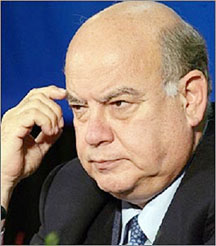The 34-country Organization of American States is better known for its cocktail parties than for its contributions to mankind, but congressional Republicans may have been drunk the week before last when they voted to end all US funding to the regional institution.
The Republican-controlled House Foreign Affairs committee passed an amendment to cut the entire $48.5 million annual US contribution to the OAS, alleging that it has become a tool of Cuba, Venezuela and other leftist regimes.
The amendment was approved in a party-line 22-20 vote, along with four other initiatives, including one that would cut foreign aid funds for Argentina, Venezuela, Nicaragua, Ecuador and Bolivia.
The two measures are highly unlikely to be passed by the Democratic-controlled Senate, but the amendment’s passage in the House has sparked a fierce debate in Washington over the OAS.
 Rep Connie Mack, R-Fla, the hardline chair of the committee’s Western Hemisphere Subcommittee who sponsored the amendment, says that “the OAS has become an anti-democratic and destabilizing force in Latin America. In these difficult fiscal times, we cannot afford to fund an organization that does not work in the national interest of the United States.”
Rep Connie Mack, R-Fla, the hardline chair of the committee’s Western Hemisphere Subcommittee who sponsored the amendment, says that “the OAS has become an anti-democratic and destabilizing force in Latin America. In these difficult fiscal times, we cannot afford to fund an organization that does not work in the national interest of the United States.”
Democrats are shaking their heads in disbelief. Rep Eliot Engel, D-NY, the subcommittee’s ranking Democrat, told me that the OAS amendment amounts to “foolish” isolationism.

“It would hurt US policy, it would hurt our standing in the region, and it would play into the hands of those who hold ill will toward the United States,” he said, noting that Washington has no presence in other regional institutions, such as the recently created UNASUR. “We would be hurting the organization in which we have most influence.”
OAS Secretary General Jose Miguel Insulza told me in an interview that the fact that the OAS is being criticized by both radical leftists in Latin America and right-wing US congressmen proves that “the extremes come together.” He added, “We are at the centre, trying to reconcile all countries in the region.”
Insulza’s OAS is also under fire from very different quarters — the human rights community. International human rights groups say Insulza is trying to weaken the semi-independent OAS Human Rights Commission, which is — alongside the OAS’s Costa Rica-based Human Rights Court — the institution’s most effective and prestigious agency.
Jose Miguel Vivanco, head of the Americas’ Department of Human Rights Watch, told me that Insulza is heading “an offensive to reduce the commission’s independence” by opposing a move to formalize its authority to pick its chairpersons. Insulza says he will appoint whomever the commission suggests as its upcoming president, but under OAS rules, he can’t approve a move to give the commission permanent rights to do so in the future.
On a positive note, the House Foreign Affairs Committee passed a bipartisan amendment sponsored by Engel and Mack that calls on the State Department to open embassies in five small Caribbean countries — Antigua and Barbuda, Dominica, St. Lucia, St. Kitts and Nevis and St. Vincent and the Grenadines — where the United States has no diplomatic missions.
Under this amendment, five of the more than 800 US diplomats currently serving in Afghanistan and Iraq would open one-person missions in these countries as they are phased out from their current posts in coming years, at no cost to taxpayers. Cuba and Venezuela already have embassies in these small Caribbean nations.
My opinion: The Republican-controlled House Foreign Affairs Committee, presided over by Rep. Ileana Ros Lehtinen, R-Miami, lost its marbles by calling for cutting US funds to the OAS.
The OAS is one of the few places where Washington can sit together with most countries in the region, friends and foes alike. At a time when China and the European Union are playing a growing role in the region — the Europeans in recent years created the Ibero-American Community of Nations in a little-disguised move to compete with the OAS — withdrawing from the OAS doesn’t make any sense.
Granted, the OAS is a monument to diplomatic frivolity and political theatre, but it’s a much-needed forum for the smallest countries in the region, and Washington needs it more than some of its foes.
© The Miami Herald, 2011. Distributed by Knight Ridder/Tribune Media Services.








